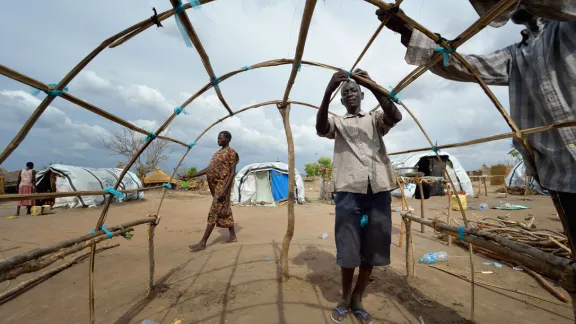
Men in South Sudan reconstruct their house after the village was destroyed in Jonglei. Photo: ACT/ Paul Jeffrey
Panel discussion about civil society and peace-building from below in South Sudan
(LWI) – The killing in South Sudan has to stop , the grassroots have to be involved at a national level and space provided for civil society to act for peace. This was the general consensus at a panel discussion themed “Peace-building from below: The role of local civil society in South Sudan” on 28 September in Geneva. The discussion was co-hosted by The Lutheran World Federation (LWF), the Inclusive Peace and Transition Initiative, the World Council of Churches and Finn Church Aid.
Civil society has little to no space to be active in South Sudan in the civil war, Father James Oyet Latansio, General Secretary of the South Sudanese Council of Churches said. “The church is always there, crying with the people, walking with the people, praying with the people,” he said, emphasizing the calling of churches to stand above ethnic divide and to offer a testimony of peace and hope, even in the midst of civil war.
Latansio underlines the role of youth and women, in particular, who should complement traditional leaders in building a broad national basis from which to advocate for peace. “The women in our church are a strong force,” he said. “Because of them, I see hope.”
Involve the grassroots
It was agreed that churches play a critical role in a peace process, because of their unique relation to the grassroots of society. “Civil society in South Sudan is still very young, very weak and fragmented,” John Ashworth, Advisor to the South Sudan Council of Churches, said in explaining the situation. ”It is also very much connected to the urban elites, whose realities are very different from the majority of the South Sudanese population.”
Even with a strong basis in the population, however, churches and other actors for peace face tremendous challenges. The youngest country of the world became independent from Sudan in 2011 after 30 years of civil war. Two years later, fighting broke out in the South Sudanese capital of Juba. The fighting quickly escalated alongside ethnic lines that mirror the political affiliations of ethnic groups.
The church is always there, crying with the people, walking with the people, praying with the people.
Child recruitment, rape, mass killings and attacks on civilians and humanitarian workers have shaped the life of the people in South Sudan since. One million have fled to neighboring countries. The hope for peace was brutally crushed in July, when a peace agreement was broken and fighting resumed.
No space for dialogue
“To be able to do something, civil society needs space to operate,” Teohna Williams, Conflict Advisor on South Sudan, said. Finding that space is nearly impossible in the charged atmosphere in South Sudan today, she added.
Williams gave an example in which a group of civilians demanded that militia move away from their village in order for the village to be safe. However, moving that particular army was perceived as a strategic advantage for the opposing militia. “We have many situations where a solution may actually contribute to the persistence of violence,” Willams said.
Hope from Liberia
“Any solution forces us to make compromises nobody wants to make, but there are examples where we can get hope from,” Matthias Wevelsiep, Right to Peace Senior Advisor with FinnChurchAid, said. He mentioned the peace processes in Liberia. “We also need to have the peace process focus less on the international sphere and more on the South Sudanese people.”
Ashworth also emphasized that the peace process should be implemented in small steps and encouraged a different way of thinking about justice. “When we talk about justice, we think primarily of retributive justice,” he said, “While it is obvious that accountability should emerge in the process, we need to look at restorative justice first. We need neutral forms of reconciliation, from which criminal courts will emerge at a later stage. This is not a quick fix – the peace process could take ten or 20 years.”
The failed peace agreement was also considered a step on the way to peace. “We knew it was flawed,” Williams conceded. “We still advocated for the signing of it. If it only brings a ceasefire, it gives us a window of opportunity.”
LWF has been advocating for peace in South Sudan for years. The LWF World Service Country program in South Sudan supports internally displaced people through humanitarian and development aid, while LWF programs in neighboring Ethiopia, Kenya and Uganda support thousands of South Sudanese refugees in the refugee camps in Gambella, Adjumani and Kakuma.
South Sudanese refugee and Olympic athlete Rose Nathike Lokonyen will offer her testimony at the Joint Ecumenical Commemoration of the LWF, casting a spotlight on the South Sudanese conflict and advocating for peace and refugee rights.


